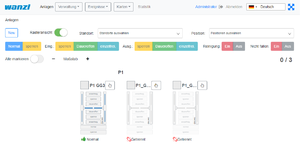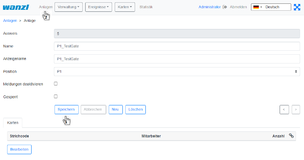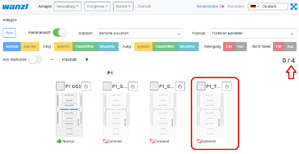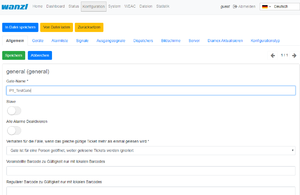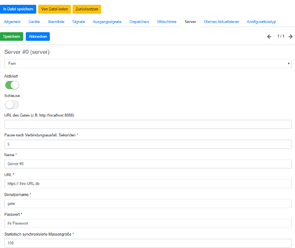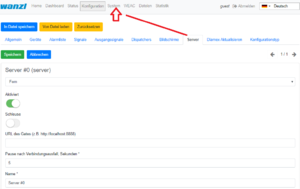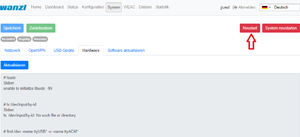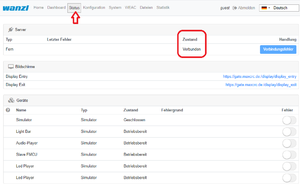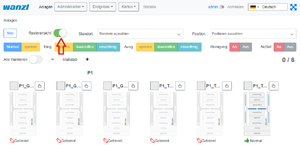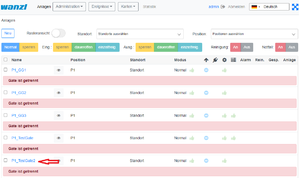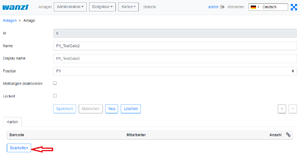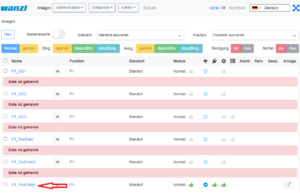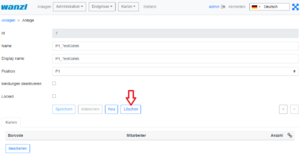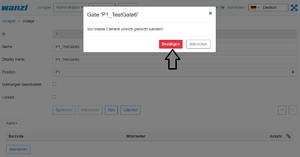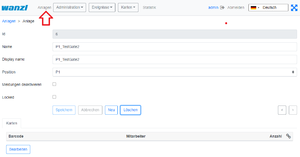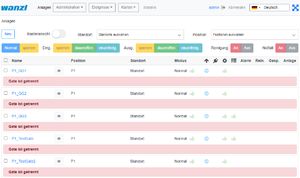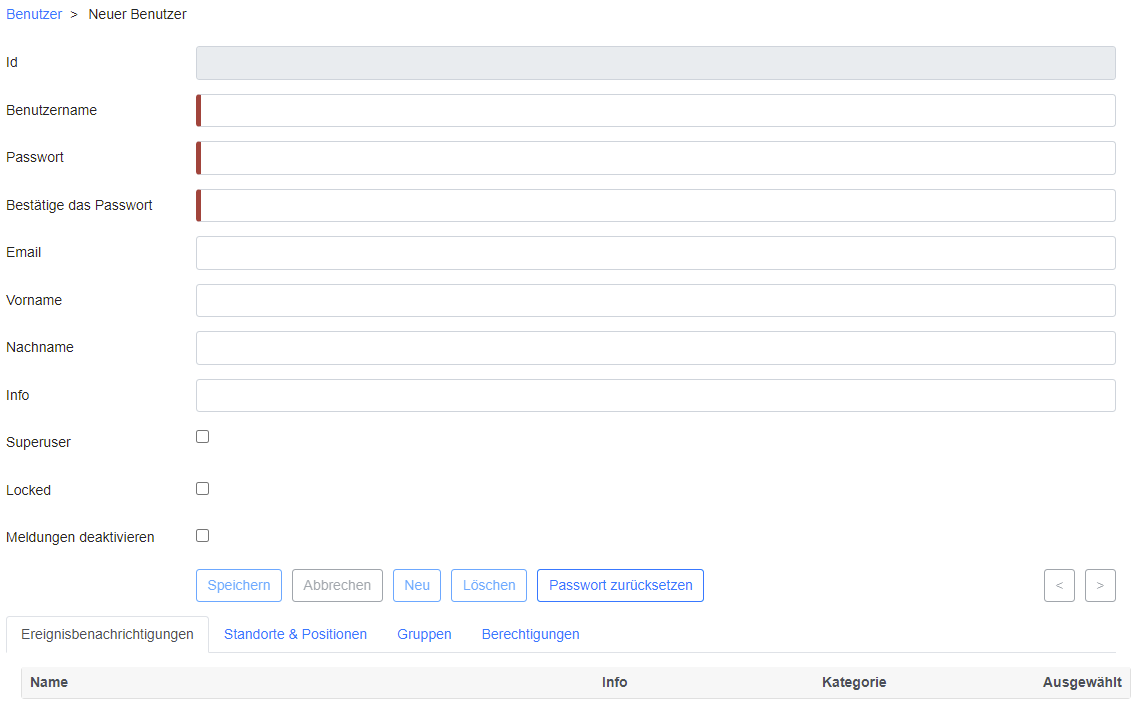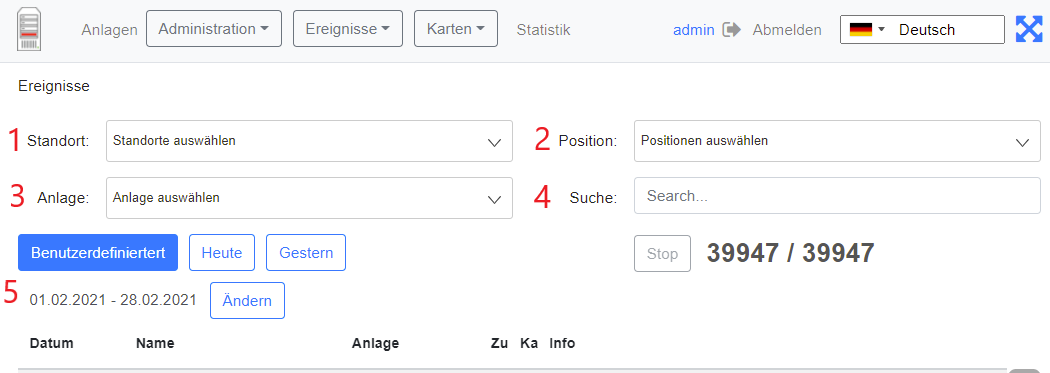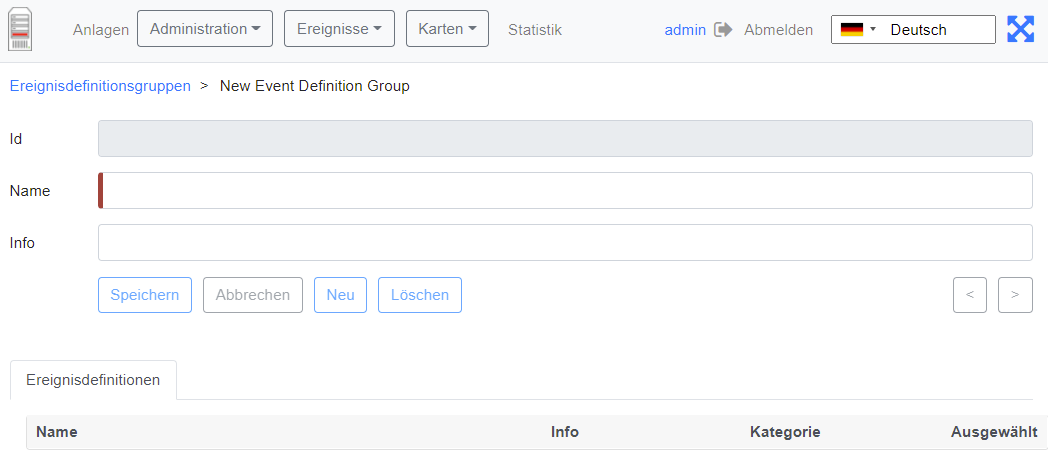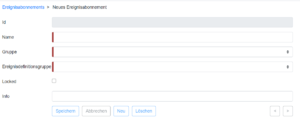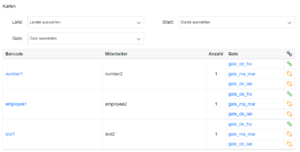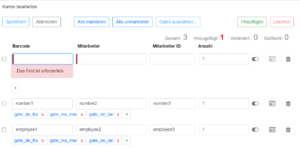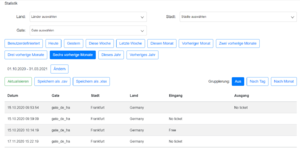Wanzl Access Manager ~ Management Dashboard
Inhaltsverzeichnis
General
The Wanzl Access Manager offers a central dashbaord for access controls in a homogeneous interface, displays the corresponding states and supports the user in the administration of these components. The Wanzl Access Manager is a leading platform for monitoring and managing access controls of security areas.
Headline
| Number | Function |
|---|---|
| 1 | Button Management Dashboard |
| 2 | Administration |
| 3 | Events Button |
| 4 | Cards Button |
| 5 | Statistics Button |
| 6 | Logged in User |
| 7 | Log out Button |
| 8 | Languages menu |
| 9 | Adjust the display to entire width of the screen |
Menu items
Gates
https://<dns-name or ip-address>/gatesIn this view, all access controls are shown in an intuitive interface. There are grouping options in two categories. First of all, you can group by Location. You can then combine different Positions within the location. Individual gates can be added using the "New" menu item.
Set up a new Gate
In this view you create a New gate. The fields Names, Displayed Name and Position of the Gate must be verified with values. Then click on Facilities.
You can now see in the view that you have created a NEW gate, in this case the fourth gate in this view.
In the next step you connect the gate to the server.
https://<IP-Adresse des Dashboards>To do this, check on the General tab that the correct gate name has been entered.
Then check the following points on the Server tab.
Server#0 (server)- must be set to remote.
Activated slide-switch is activated.
Your server should be entered under Name*.
Your URL should be entered under URL*.
Gate should be entered under Username*.
Your password should be entered under Password*.
Save at the end.
In the next step, please click on System in the top bar.
You will now see the following display, here please press restart once. Now your new gate should be connected.
Finally, you can check the connection in the Status tab. CONNECTED must now appear under State.
Edit existing Gate
https://<dns-name or ip-address>/gatesYou are in the same view as where you would create a new gate.
Please move the slide switch "Grid view" to the left.
In the view click on the name of the gate which you want to edit (in the example P1_TestGate2).
In this view, please press the "Edit" function.
You can now edit the gate in this view.
Remove Gate
https://<dns-name or ip-address>/gatesYou are in the same view as where you would create a new gate.
Please move the slide switch "Grid view" to the left.
In the view click on the name of the gate which you want to delete (in the example P1_TestGate6).
In this view, please press the "Delete" function.
To be on the safe side, you will now be asked again whether you really want to delete the element? Please confirm this.
After deleting, you will automatically be shown the next gate (here in the example P1_TestGate2). Please click on attachments here.
You will then see in the grid view that Gate P1_TestGate6 is missing and has been successfully deleted.
Administration
User
https://<dns-name or ip-address>/usersAuf dieser Seite sehen Sie eine Übersicht aller Benutzer

| Nummer | Funktion |
|---|---|
| 1 | Neuen Benutzer anlegen |
| 2 | Benutzer nach Standort filtern |
| 3 | Benutzer nach Postition filtern |
Set up new User
Klicken Sie unter Benutzer auf den Button Neu
https://<dns-name or ip-address>/new-user| Feldname | Beschreibung |
|---|---|
| Id | Automatisch generierte eindeutige Nummer des Benutzers |
| Benutzername* | Benutzername des Benutzers für die Anmeldung |
| Passwort* | Passwort des Benutzers für die Anmeldung |
| Email Adresse des Benutzers zum Versand von Log Nachrichten | |
| Vorname | Vorname des Benutzers |
| Nachname | Nachname des Benutzers |
| Info | Beschreibung des Benutzers |
| Superuser | Die höchsten Rechte werden dem Benutzer vergeben |
| Locked | Die Anmeldung des Benutzers ist gesperrt |
| Meldungen deaktivieren | Der Benutzer erhält keine Benachritgungen im FMCU Management Dashboard |
* Unbedingt erforderliche Felder Durch den Button Speichern wird der neue Benutzer angelegt.
Edit existing User
Klicken Sie unter Benutzer auf den zu bearbeitenden Benutzer
Event Notifications
Unter diesem Reiter können die Benachrichtigungen ausgewählt werden welcher der Benutzer erhalten soll.
Hinweis: Ist die Checkbox Meldungen deaktivieren gesetzt werden unabhängig von diesen Einstellungen keine Benachrichtigungen angezeigt.
Locations & Positions Tab
Man kann unterschiedliche Standorte in Länder und Städte festlegen. Über das Berechtigungsmodell lassen sich separate Zugriffsrechte für jeden Standort definieren.
Groups Tab
Unter diesem Reiter können Sie die Gruppenmitgliedschaften des Benutzers anpassen.
Permissions Tab
Unter diesem Reiter werden die Berechtigungen des Benutzers angezeigt
Durch den Button Speichern werden alle Änderungen angewendet.
Groups
https://<dns-name or ip-address>/groupsAuf dieser Seite sehen Sie eine Übersicht aller Gruppen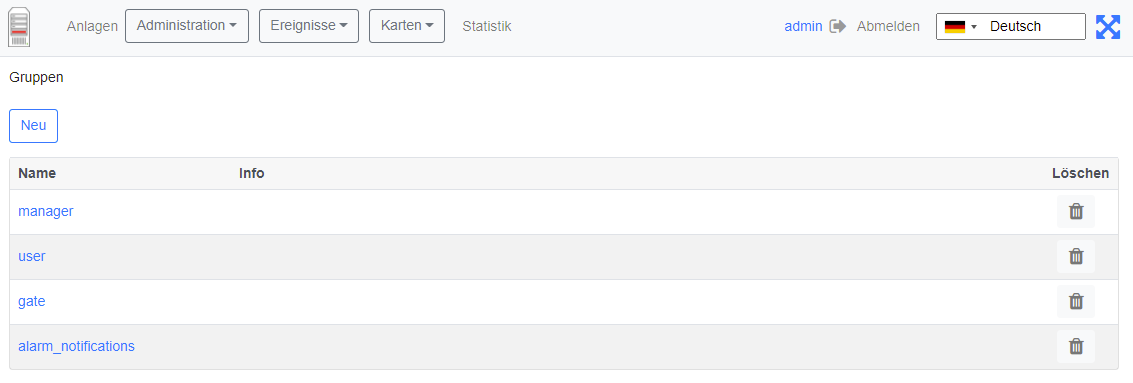
Set up new Group
https://<dns-name or ip-address>/new-groupKlicken Sie unter Gruppen auf den Button Neu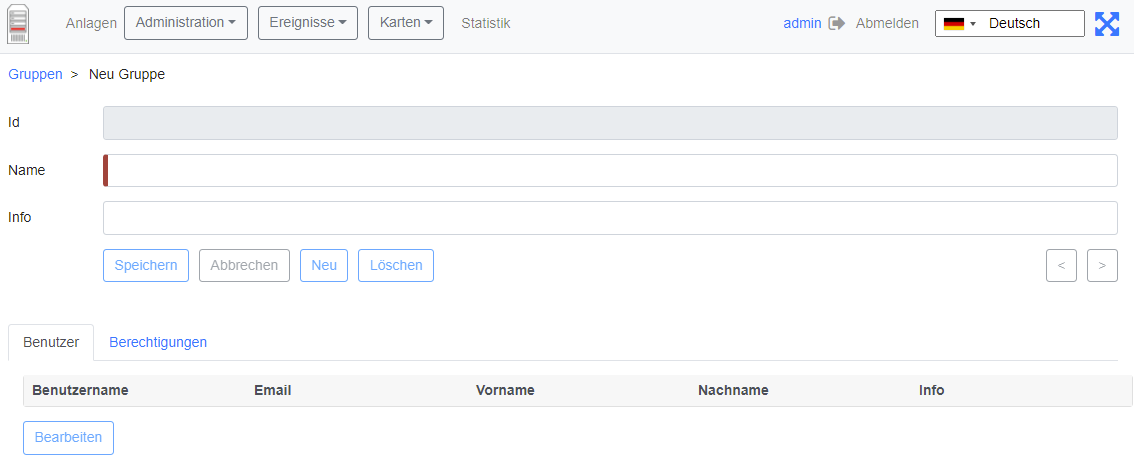
| Feldname | Beschreibung |
|---|---|
| Id | Automatisch generierte eindeutige Nummer der Gruppe |
| Name | Name der Gruppe |
| Info | Beschreibung der Gruppe |
* Unbedingt erforderliche Felder
Durch den Button Speichern wird die neue Gruppe angelegt.
Edit existing Group
Klicken Sie unter Gruppen auf die zu bearbeitende Gruppe
Users Tab
Unter diesem Reiter können Sie die Mitglieder der Gruppe anpassen.
Permissions Tab
Unter diesem Reiter werden die Berechtigungen angezeigt welche den Mitgliedern der Gruppe vererbt werden.
Durch den Button Speichern werden alle Änderungen angewendet.
Positions
https://<dns-name or ip-address>/citiesOn this page you can see an overview of all positions
Set up new Position
https://<dns-name or ip-address>/new-cityUnder Positions click on the button New Enter the name of the position and assign the position to a location using the dropdown field. Click on the Save button to create the position
Edit existing Position
Under Positions click to edit the position
Here you can edit the position name and location
Locations
https://<dns-name or ip-address>/countriesAuf dieser Seite sehen Sie eine Übersicht aller Standorte
Set up new Location
https://<dns-name or ip-address>/new-countryKlicken Sie unter Standorte auf den Button Neu
| Feldname | Beschreibung |
|---|---|
| Id | Automatisch generierte eindeutige Nummer des Standorts |
| Name* | Name des Standorts |
| Code* | Ländercode des Standorts |
| Info | Beschreibung des Standorts |
* Unbedingt erforderliche Felder
Klicken Sie auf den Button Speichern umd die Position anzulegen
Edit existing Location
Under Location Under Location, click the location you want to edit
Hier können Sie die den Namen, den Code sowie die Info des Standorts bearbeiten
Locations & Positions
https://<dns-name or ip-address>/locationsHere you can see an overview of all positions and their assigned locations
Configuration
https://<dns-name or ip-address>/configurationsEvents
Events
https://<dns-name or ip-address>/eventsIn this view, the events of all access controls are shown in an intuitive list view. There are filtering options and a name search for the events.
The following filters can be set:
- Location
- Position
- Factory
- Search by Event name
- Time Period
Event Definitions
https://<dns-name or ip-address>/event-definitionsIn this view, all events that the FMCU contains are listed and their event definition groups, supported states and categories are assigned.
Event definition Groups
https://<dns-name or ip-address>/event-definition-groupsAll event definition groups are listed under this tab.
Create a new Event definition Group
Click Event defenition groups on the Button New
| Fieldname | Description |
|---|---|
| ID | Automatically generated unique group number |
| Name | Name of the group |
| Info | Group description |
* Absolutely required fields
Under the Event defenition tab select the event definitions that are to be assigned to the group.
Event Subscriptions
https://<dns-name or ip-address>/event-subscriptionsThere is the possibility to link groups of alarm messages with groups of users. As a result, only group members are notified of alarm messages that are also grouped,
| Fieldname | Description |
|---|---|
| ID | internal value |
| Group | Summary of users |
| Ereignisdefinitionsgruppe | Event definition group |
| Locked | Notifications deactivated/activated |
| Info | Description field |
Notifications
https://<dns-name or ip-address>/notificationsSent notifications are displayed in this overview. You can adjust the view accordingly using a date filter.
Cards
Cards
https://<dns-name or ip-address>/cardsThis view shows an overview of the RFID cards in the system with the gates enabled for access.
Edit Cards
https://<dns-name or ip-address>/cards-editIn this view, cards can be added / removed and authorizations for individual gates can be defined.
| Field | Description |
|---|---|
| Barcode | Card content that is captured by the reader |
| Employee | Description field |
| Employee ID | Description field |
| Quantity | Number of accesses for this card |
Statistics
In this view, all activities for the assigned access controls are shown. You can adjust the view with date filters. It is possible to group the screen output, e.g. only to evaluate the number per day or month. Finally, the data can be exported in Excel format or CSV-format.
